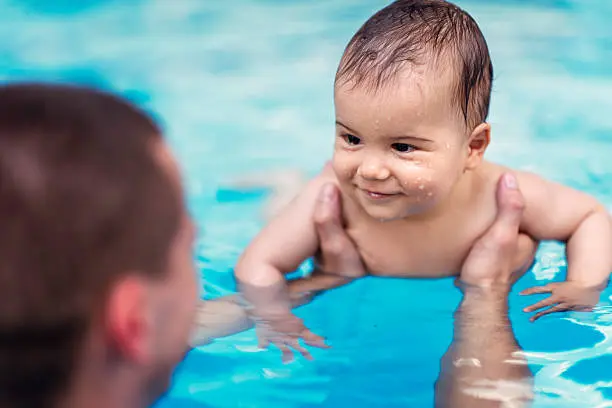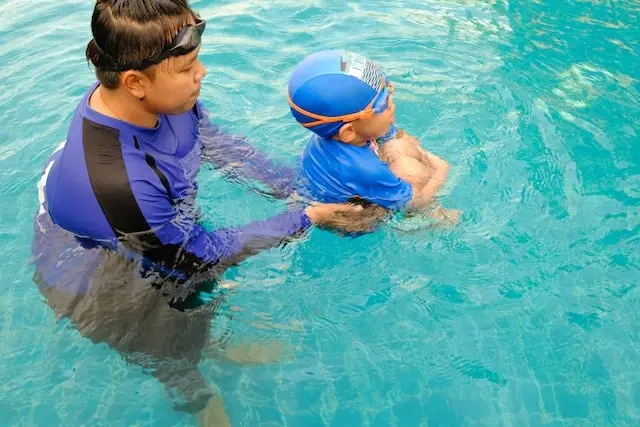7 Authentic Answers on baby swim lessons
Do you know that your little one can have a better, stronger and healthier life through baby swim lessons and it is a life-saving art? And it is a wonderful opportunity for toddlers and babies to explore and become comfortable in the water. Let’s find together the benefits of swim lessons, what to expect during these classes, and why they are crucial for your baby’s early development.
- Water safety: Giving babies the lesson to swim at a young age is an excellent approach to encourage water safety. Infants can learn key abilities such as floating, kicking and even holding their breath underwater by being introduced to water in a controlled context. These abilities lower the danger of accidents and help them gain confidence near water.
- Physical development: Baby swimming classes help your child’s entire physical development. Water sports help them improve their motor abilities, coordination, balance, and muscle strength. Floating and moving in the water create a sensory experience that engages their senses and boosts their neurological development.
- Bonding and social interaction: participating in baby swim lessons helps parents and caregivers form deep bonds with their children. These sessions frequently include songs, games, and interactive activities that foster connections and a positive association with water. Furthermore, these sessions allow babies to connect with other children and develop social skills in a safe and supervised atmosphere.
When enrolling your child in swim lessons, find a popular program that promotes safety and employs certified teachers who specialize in teaching infants and toddlers. Lessons should be age-appropriate, including games, songs, and gentle techniques tailored to young children’s specific requirements.
Finally, baby swim lessons have several advantages for infants and toddlers, such as water safety, physical development, bonding, social contact, and cognitive and emotional growth. These classes lay the groundwork for a lifetime of fun and proficiency in the water, as well as valuable life skills.
In this article
Are baby swim lessons worth it?
Baby swim lessons can be worth it for several reasons. Here are some potential benefits:
- Water safety: Early exposure to water and baby swim lessons can help become comfortable in aquatic environments. They learn basic water safety skills, such as floating, kicking, and reaching for the pool edge, which can be crucial in preventing accidental drowning.
- Physical development: Swimming offers a unique opportunity for babies to exercise and develop their motor skills. Water provides a supportive and low-impact environment, allowing babies to strengthen their muscles, improve coordination, and enhance balance.
- Cognitive development: Baby swim lessons can stimulate cognitive development through sensory experiences. Babies engage their senses of touch, sight, hearing, and proprioception (body awareness) in the water, which can contribute to their overall brain development.
- Bonding and socialization: Participating in baby swim classes can be a bonding experience for both babies and their caregivers. It provides quality time spent together in a fun and stimulating environment. Babies may also interact with other children, promoting socialization and early social skills.
- Water comfort: By introducing babies to water early on, baby swim lessons can help reduce fear or anxiety associated with water. This can have long-term benefits, making future swimming experiences more enjoyable and increasing the likelihood of children becoming confident swimmers.
While baby swims lessons offer various advantages, it’s important to consider the following factors:
- Age appropriateness: Not all swim programs cater specifically to babies. Look for lessons that are designed for infants and provide a safe and developmentally appropriate environment.
- Qualified instructors: Ensure the swim instructors are experienced in teaching babies and hold relevant certifications in water safety and infant swimming instruction.
- Health considerations: Consult with your paediatrician before enrolling your baby in swimming lessons, particularly if your child has any health conditions that might affect their participation.
Ultimately, deciding to enrol your baby in swimming lessons depends on your circumstances, preferences, and the availability of reputable swim programs in your area.
What is a baby swim lesson?
A baby swim lesson is an arranged swimming instruction that is developed purely for newborns and toddlers. These courses are designed to expose newborns to water in a fun and safe way. While also promoting water safety, physical development, and aquatic comfort.
It is important to remember that the grouping and content of baby swim lessons may differ depending on the program and instructor. When thinking about enrolling your baby in swim lessons, look into local programs, ask about their curriculum, and find a respected program that fits your goals and ideals.
How to prepare babies for swim lessons?
Getting your baby ready for swim classes entails several procedures to assure their comfort, safety, and preparation for the water. here are some points to help you get your infants ready for swimming lessons.
- Consult with your paediatrician: Before starting baby swim lessons please consult with your paediatrician to ensure that your baby is physically ready and has no health condition that may affect their participation.
- Choose an appropriate swim program: Always select a swim program that is specially designed for infants and toddlers. Look for programs that prioritize safety, have experienced instructors and provide a child-friendly environment.
- Get familiar with the water: Firstly familiarize your baby with the water at home by giving a bath or shower, allowing them to play with water toys or gently pouring water on their body.
- Maintain a good attitude: Begin swim classes with joy and excitement. Babies are sensitive to their caregiver’s emotions, so having a calm and supportive tone might help your baby feel more at ease in the water.
- Choose well-fitted swimwear: A well-fitted swimwear is the most important thing to ensure that the baby is in a completely comfortable condition and doesn’t restrict their mobility in the water.
- Pack essential items: Prepare a swim bag with essentials like a towel, spare diapers, a change of clothes, a cap, and sunscreen(if needed). Having this material in hand will make the transition before and after baby swim lessons go more smoothly.
- Establish a routine: Make a routine according to you. A perfect routine will help you to continue your baby’s swimming lessons regularly and on time.
- Communicate with the instructor: Before starting the lessons discuss with the swim instructor about any specific concerns, needs, or preferences you have regarding your baby. This will help the instructor to better understand and accommodate your baby’s requirements.
- Maintain a supportive presence: Your presence in the water will make your baby more familiar with the water and it will give a feeling of safety to them. So offer them physical support, encouragement, and reassurance.
Remember that each little sweet candies are unique, and they may respond differently to swim lesson. Be patient and positive, follow your baby’s cause, and adjust your approach accordingly to ensure an enjoyable experience for both you and your little one.
How long does it take to teach a baby to swim?
The time it takes to teach a baby to swim can vary significantly depending on various factors, including the baby’s age, temperament, exposure to water, and the frequency and consistency of swim lessons. It’s important to note that teaching a baby to swim typically involves gradually building skills and comfort in the water rather than expecting them to fully swim independently at a young age.
Babies can begin learning water skills as early as a few months old, but it’s important to approach it as a gradual process. The focus in the early stages is typically on water acclimation, building water confidence, and introducing basic water movements and safety skills.
The time duration it takes for a baby to become comfortable and develop swimming skills can range from a few weeks to several months or longer. It’s important to remember that each baby develops at their own pace, and patience and consistency are key. Some babies may take a little more time to adjust to the water and develop the necessary skills, while others may progress more quickly.
Consistent participation in swim lessons, regular exposure to water through supervised play, and practising water skills outside of lessons (such as during bath time) can all contribute to the baby’s progress in learning to swim. It’s also crucial to create a positive and enjoyable environment that encourages the baby’s engagement and exploration in the water.
Do babies need swim lessons?
Babies don’t need any formal swim lessons but it is always can be a great idea to start baby swim lessons. There are several reasons why it can be beneficial for your baby and you.
- Water safety: Baby swim lessons will help your infant to get familiar with water. it will be easier for them to spend time and have fun in the water.
- Physical development: As we know that swimming is a whole-body exercise. It helps to build vital motor skills and also boosts coordination and many more. it gives your baby an overall development to live healthily and safely.
- Parent-child bonding: It is an incredible bond between parents and a child. Swimming helps to improve and strengthen that bond and makes it stronger and deep. It helps to make their emotional bonding better and increases the understanding level of parents.
So if you are trying to fix the water-related fear of your baby then it is a brilliant decision to fix a swim class for your baby. After practising swimming the fear of water and unsafety ness will disappear soon.
How much does baby swim lessons cost?
There has no specific cost for baby swim lessons. It depends on the area and the qualification or experience of the coach. Additionally, the fee structure may vary according to group lessons and private lessons. Some general guidelines have been provided.
- Group lessons: Group lessons are more affordable than private lessons. The cost can range from around $10 to$30 per session.
- Private lessons: Private lessons can be more personalized. Private swimming lessons are more expensive than group swimming lessons. The cost range from $30 to $100 or more per session.
It is best to research local swim programs or facilities for a better fee structure.
Do baby swim lessons have pros and cons?
As we know that everything has its own advantages and disadvantages. Just like that swimming lessons also have their own pros and cons. Let’s discover together some pros and cons of baby swim lessons.
Pros:
- Water safety: It is a life-saving skill. Prevents baby drowning.
- Bonding: Bonding between baby and parents will be stronger.
- Cognitive development: Baby will gradually develop cognitive skills.
- Muscle strength: It strengthens the muscle and makes your child more strong.
cons:
- Cost: Cost is a vital cause of baby swimming.
- Comfort: Comfortable place is a significant criterion to make the swim lesson joyful.
- Time commitment: Time is a crucial point. It is very important for you to make a fixed time to spend with your baby in the pool.
- Health consideration: Some babies have some health issues so you may consult with your doctor and the instructor first. Then if it is ok to join a class then you may continue the process.





